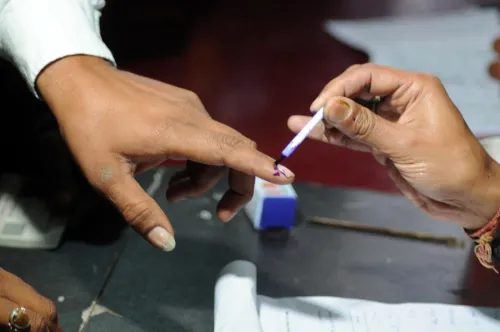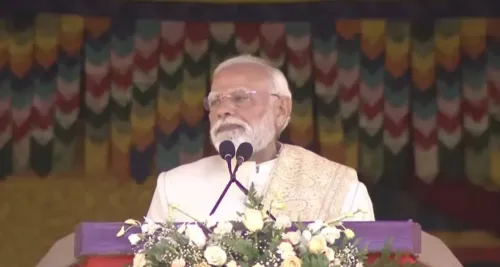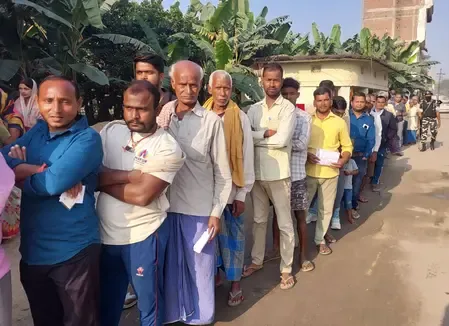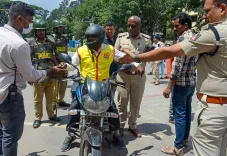Why Did the Court Deny the Extension of Mahrang Baloch's Physical Remand?
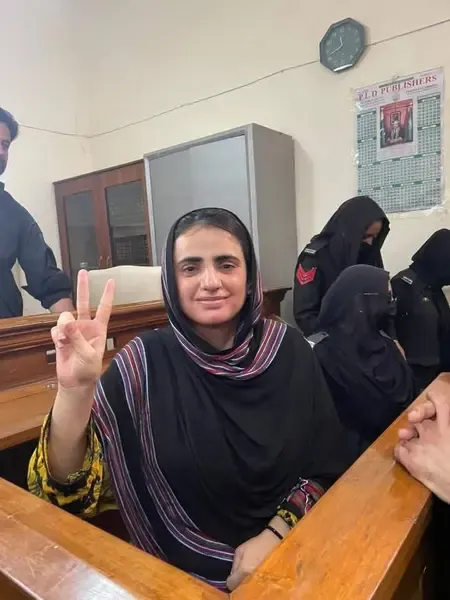
Synopsis
Key Takeaways
- The court ruled against extending Mahrang Baloch's remand.
- Concerns over the amendments to the Anti-Terrorism Act were raised.
- Significant number of enforced disappearances reported in Balochistan.
- Mahrang Baloch emphasizes the ongoing repression of activists.
- Calls for awareness of the human rights situation in Balochistan.
Quetta, Sep 26 (NationPress) An anti-terrorism court in Quetta has denied the request made by the Counter Terrorism Department (CTD) to prolong the physical remand of Baloch Yakjehti Committee (BYC) leader Mahrang Baloch and several other organizers, as reported by local media, citing the group’s lawyer.
In an interview with the prominent Pakistani newspaper Dawn, a member of the BYC legal team, Advocate Israr Jatak, stated, "The Quetta ATC-1 has declined to extend the physical remand for five individuals, including Mahrang, Bebow Baloch, Sibghatullah Shahji, Beberg Baloch, and Gulzadi, and has decreed that they be transferred to jail under judicial remand."
Today, the CTD brought Mahrang Baloch and others to court following the completion of their 15-day physical remand that was initially granted on September 11, according to Dawn. During the hearing led by Judge Muhammad Ali Mubeen, advocates Shoaib Mengal and Jatak represented the accused.
The CTD sought an extension of Mahrang Baloch's physical remand. Nonetheless, Judge Mubeen dismissed the request and ordered that the accused be placed in jail custody, as per the report.
Previously, on September 11, a judge from the Quetta ATC had approved the extension of Mahrang Baloch's physical remand and other BYC leaders on the police's request. The BYC chief was taken into custody under Section 3 of the Maintenance of Public Order (MPO), a law that allows authorities to detain individuals suspected of threatening public order, for an initial duration of 30 days.
Later in April, the Balochistan Home Department extended her detention for an additional 30 days, marking the second term. Subsequently, a fourth extension was issued after the BYC leaders had served three months in detention as of June. Following their detention under the MPO, cases were filed against Mahrang Baloch and other BYC leaders under various sections of the Anti-Terrorism Act and the Pakistan Penal Code.
On September 14, detained BYC leader Mahrang Baloch voiced her concerns regarding the Balochistan Assembly's amendment to the Anti-Terrorism Act (ATA) of 1997, labeling it a "dangerous move" that legitimizes state repression and silences dissenting voices. She argued that this amendment, in conjunction with June’s Anti-Terrorism (Amendment) Bill 2025, would primarily target peaceful activists, political workers, and opposing voices rather than violent offenders.
In a statement released on X, Baloch expressed, "I am shocked and angered by the Balochistan Assembly’s decision to approve yet another series of amendments to the Anti-Terrorism Act of 1997 this week. Under this so-called amendment, the unelected and unpopular government of Balochistan claims it is safeguarding judges, witnesses, lawyers, and prosecutors. They assert it will create a flexible legal framework for the state to address evolving security challenges. In truth, this is nothing more than a perilous step that legitimizes oppression and silences dissenting voices."
"Our deepest fears are materializing. This amendment, along with the June’s Anti-Terrorism (Amendment) Bill 2025, will not be directed at violent offenders but will be weaponized against peaceful activists, political workers, and dissenters. This law strips away the fundamental right to a fair trial guaranteed under Article 10A of Pakistan’s constitution, paving the way for secretive courts where justice is trivialized," she added.
This statement followed the introduction of the amendment, referred to as the Anti-Terrorism Balochistan (Amendment) Act 2026, presented by Parliamentary Secretary Mir Zareen Khan Magsi on behalf of the provincial home department, as reported by The Balochistan Post. Officials stated that modifications were being implemented to enhance the counter-terrorism framework "in accordance with international standards" by providing a more secure legal environment for judges, prosecutors, defense lawyers, and witnesses.
Mahrang Baloch revealed that over 50 targeted crackdowns on Baloch Yekjehti Committee (BYC) members have occurred since March, resulting in hundreds of activists facing arrests, abductions, or forced disappearances. According to her, there were 814 instances of enforced disappearances documented between January and June.
"The security landscape in Balochistan has been characterized by an escalating campaign against peaceful rights activists. Since March, there have been over 50 targeted operations against BYC members. Hundreds of activists have been detained, abducted, or forcibly disappeared. In March alone, 147 individuals went missing. In April, 166 more were added to this tragic tally. Just between January and June, there were 814 enforced disappearances, nearly matching the total of the preceding year. Students, laborers, activists, and ordinary citizens are systematically victimized by the state and its agencies. At least 131 individuals were killed without trial in the first half of this year. These killings occurred through custodial torture, staged encounters, and indiscriminate military operations," the Baloch activist stated on X.
"In a single week of September, six individuals from the Kech district were murdered in targeted assaults by death squad members. This is not a security strategy; it is a slow-motion genocide. Each day, an average of four to five Baloch individuals are abducted, while one to three are executed or killed by security forces and their accomplices. Concurrently, state-supported private militias, locally known as death squads, have been reactivated. These factions collaborate with security agencies to instill terror in the civilian populace. The state is conducting a brutal war against the Baloch, employing both legal means, such as oppressive laws, and illegal tactics, such as death squads. Both serve the same objective: the ethnic cleansing and domination of the Baloch people," she concluded.


